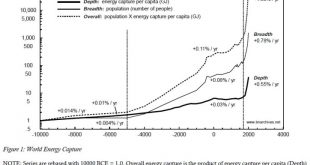from Blair Fix, Shimshon Bichler and Jonathan Nitzan Nowadays, it is commonplace to claim that the economy overuses our limited material and energy resources (Figure 1) and that this overuse threatens both human society and the biosphere. Other than ant-science cranks, the only ones who seem to deny this claim are mainstream economists (Fullbrook 2019). In our view, though, this conventional condemnation of the economy is somewhat misleading. As we see it, the root of our ecological...
Read More »Mainstream theories of income distribution
from Lars Syll Markets are never just given. Neither God nor nature hands us a worked-out set of rules determining the way property relations are defined, contracts are enforced, or macroeconomic policy is implemented. These matters are determined by policy choices. The elites have written these rules to redistribute income upward. Needless to say, they are not eager to have the rules rewritten — which means they also have no interest in even having them discussed. But for progressive...
Read More »What’s in a model… (an economic one, that is)
What’s an economic model? A little semantic intro (don’t worry, we will get to Keynes in a moment) I work together with biologists, agronomists and even test animal specialists on a regular basis. These people use words like ‘conceptual models’ or ‘even ‘animal model’ all the time. Check this: ‘Mouse Models of Diabetic Nephropathy‘. Yes, a live animal is considered to be a scientific model. I had to get used to this as this use of the word ‘model’ transcended the boundaries used in the...
Read More »The randomistas revolution
from Lars Syll In his new history of experimental social science — Randomistas: How radical researchers are changing our world — Andrew Leigh gives an introduction to the RCT (randomized controlled trial) method for conducting experiments in medicine, psychology, development economics, and policy evaluation. Although it mentions there are critiques that can be waged against it, the author does not let that shadow his overwhelmingly enthusiastic view on RCT. Among mainstream economists,...
Read More »Origins of central banking
from Asad Zaman In this post, we provide some details regarding the origins of the Bank of England, the mother of all Central Banks and discuss some implications of this early history for our modern world. A link to a video-lecture on the topic is given at the bottom of the post. We start with an excerpt from Ellen Brown in the Web of Debt: The Shocking Truth About Our Money System and How We Can Break Free. Below, selected passages from Chapter 6: Pulling The Strings Of The King: The...
Read More »Dean Baker Live Stream
Support the stream: https://streamlabs.com/deanbaker1
Read More »Dean Baker Live Stream
Support the stream: https://streamlabs.com/deanbaker1
Read More »Dean Baker Live Stream
Support the stream: https://streamlabs.com/deanbaker1
Read More »Why is populism on the rise and what do populists want?
from Dean Baker In the United States, the pay of a typical worker has badly trailed productivity growth over the last four decades, allowing only marginal improvements in living standards over this period. At the same time, a small number of people have gotten incredibly rich in the finance and tech sectors and by being top executives in major U.S. corporations. There is a similar, if somewhat less stark, picture in most other wealthy countries. The standard story for this rise in...
Read More »Economics becomes more precise and rigorous — and totally useless
from Lars Syll Nowadays there is almost no place whatsoever in economics education for courses in the history of economic thought and economic methodology. The standard view among mainstream economists is that students shouldn’t think about what they are doing, but just do it. This is deeply worrying. A science that doesn’t self-reflect and asks important methodological and science-theoretical questions about the own activity, is a science in dire straits. The main reason why mainstream...
Read More » Real-World Economics Review
Real-World Economics Review






